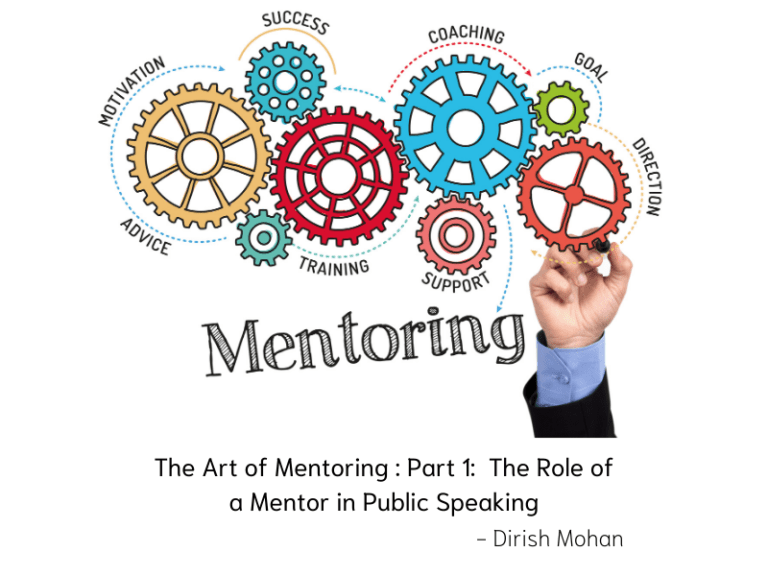The Art of Mentoring : Part 1
The Role of a Mentor in Public Speaking

The Role of a Mentor in Public Speaking
I recently completed 15 years in Public Speaking. I still remember the day I walked into a toastmaster club, as a young lad of 20 , nervous, jittery and yet curios to learn what it takes to speak confidently before an audience. The journey that transpired post that has been fascinating. As the months passed by, from being a novice who found joy in people applauding for every little talk I delivered, to facing failures at various contests, it not only helped me discover my voice on stage, but shape my personality and character as a human being. With the passage of time, I gradually discovered that public speaking was an artform, and needed the same discipline, dedication and time it took to learn say classical music or Bharatanatyam. Like any artform, it also needs a coach/guru/mentor to guide you through the process of not just getting the nuances of public speaking right, but also the attitude and approach required towards stage, to make you an effective and confident speaker.
I have had numerous mentors who have helped and supported me through this journey. Each person was different, unique and had a varied perspective, that added a new dimension to my learning curve. When I look back today, it is the numerous hours I spent with them in polishing a 7-minute speech, that helped hone my skills and appreciate this artform better.
In the first 3 years of my journey all I did was follow my mentor’s instructions on stage- if they asked me to move left, I would move left. If I was asked to increase my base voice and exhibit a certain body language or emotion, I blindly did it, not knowing why it was done. The turning point however was in 0ct 2009, when I quit Sunshine Toastmasters to co-found Banjara Toastmasters. Here I was, a speaker with some experience having to work and mentor a club of new members along with Dr Chaya Nair, a veteran toastmaster and a coach in her own right. It was this journey of having to don the hat of a “Mentor” at 24 that changed my perspective and understanding, not just of public speaking but also of people and human behaviour.
Over the last one decade I have worked with people across age groups, from little children (who are extremely smart and quick to learn) to working professionals and business leaders who have been older than me by even over 30 years! Each person is unique, different, has their way of thinking, their strengths and their crutches. The journey of understanding each of them, devising ways that would work best for them, while helping them discover their true potential has been amazing- I got to learn, unlearn ,reflect on my own skills as a speaker and revisit mistakes I had committed in the past. It’s funny but true, that it’s only when you start working at coaching others, you start to understand and appreciate mistakes you committed while on stage. Coaching/Mentoring can be a brilliant self-learning tool. It is mentoring others and the knowledge exchanged with my mentees that has helped me become a public speaking coach that I am today. Own the stage, the flagship practical public speaking course has completed 7 batches over the last 1.5 years and evolving into one of the popular public speaking workshops/programs in Bangalore. This article is driven by my urge to share my perspective based on the different kinds of mentees I have encountered over the years.
In Part-1 of this series on Mentoring, I shall deal with the basic mistakes both coaches and mentees commit, while simultaneously also mentioning what a mentor should endeavour to do, while coaching his mentees.
